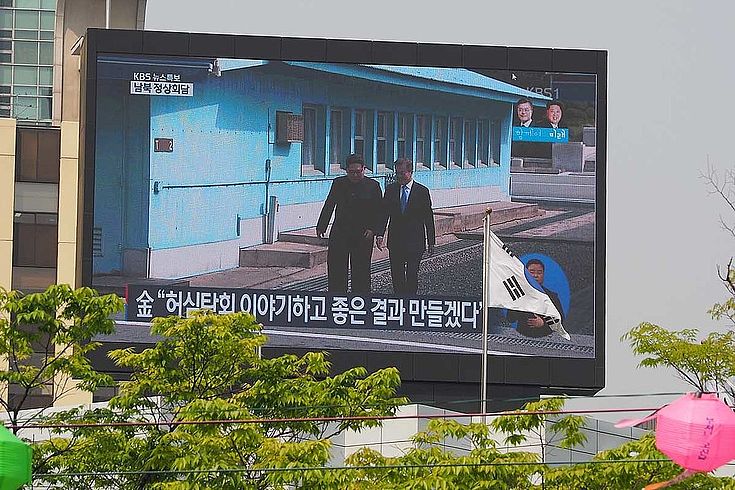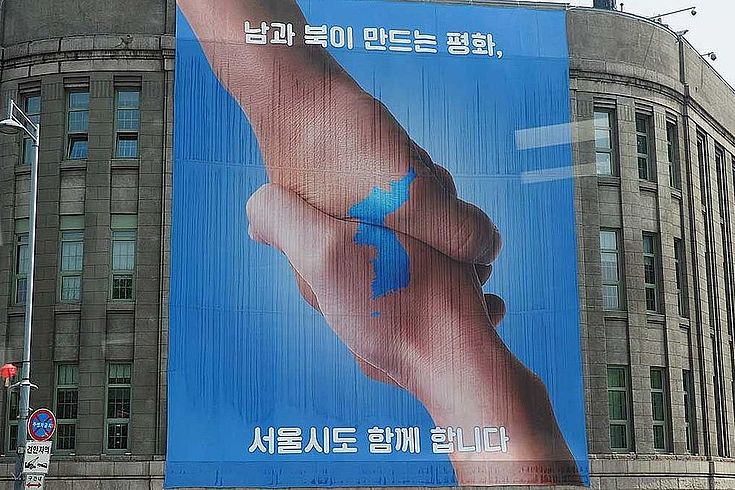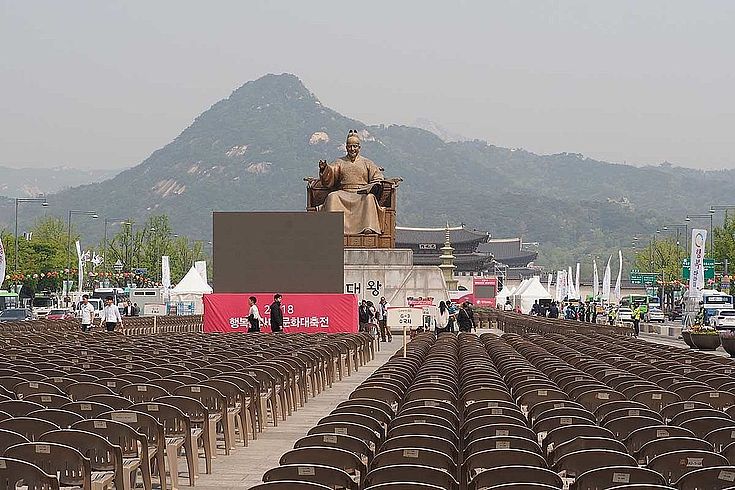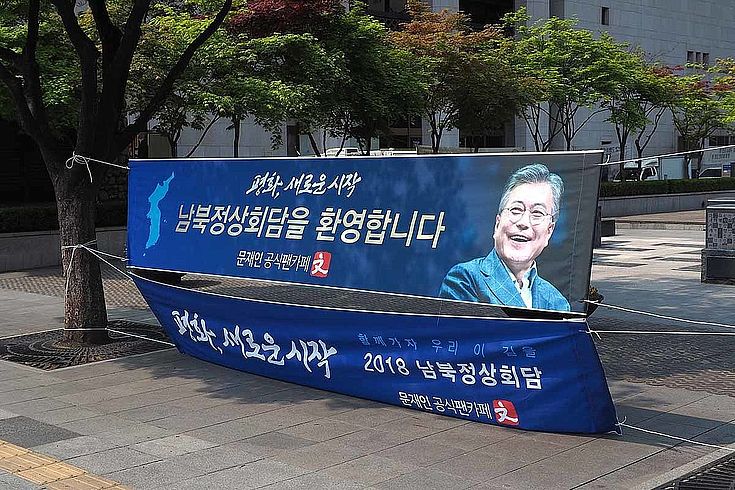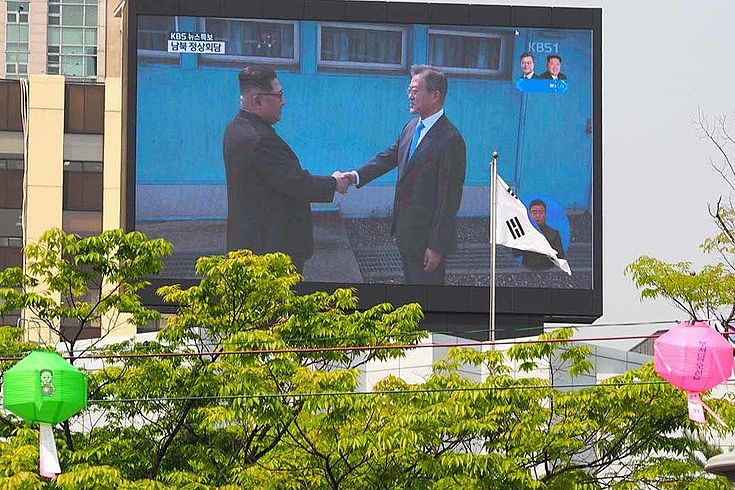Inter-Korean Summit
Beautiful Words - Actions Must Follow
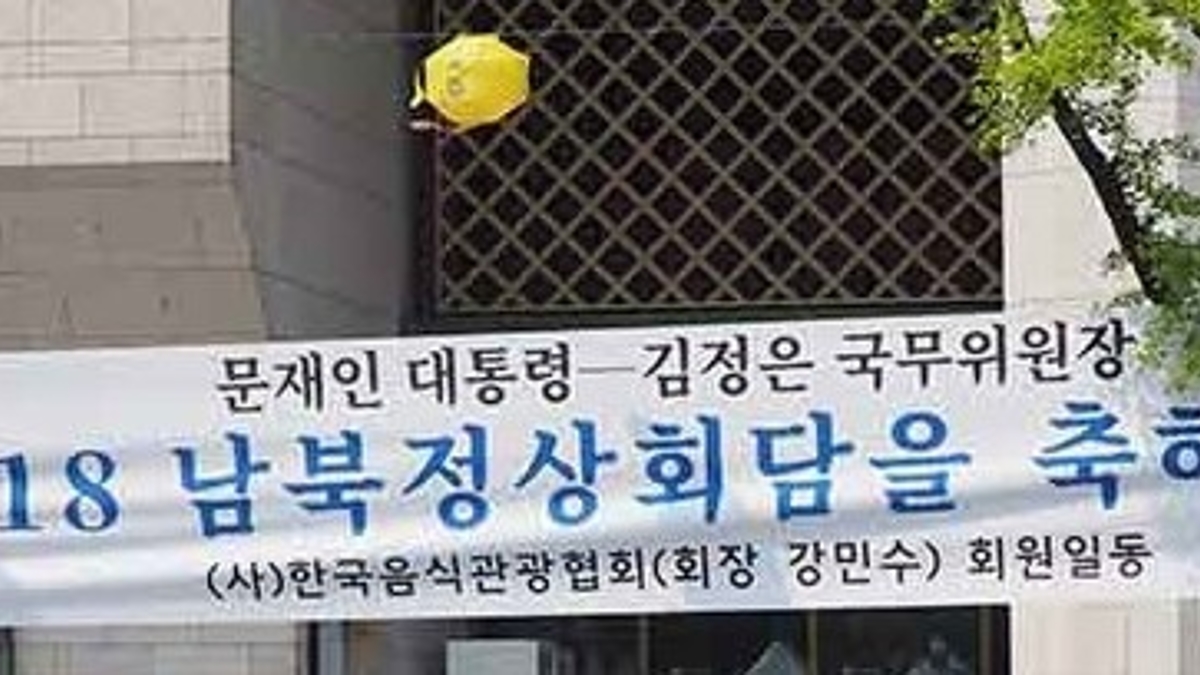
HSS
The summit meeting of South Korean President Moon Jae-In with North Korean leader Kim Jong-Un on Friday is praised in the South Korean press, but also internationally as "historic" and "the beginning of a new era". The South Korean government itself has set the tone with the "new era of peace" that is now beginning. In fact, symbolic words and gestures have not lacked. However, the summit between Kim Jong-Un and US President Trump, as well as the practice of disarmament negotiations and the practice of inter-Korean relations, will reveal if the new era is not on a shaky ground - as in 2007, when similarly lofty statements were made by both sides.
For the first time Kim Jong-Un and Moon Jae-In crossed the inter-Korean border together. Are there just nice gestures or is there an actual progress in the process of rapprochement?
HSS
Historical Gestures, but…
But one thing at a time: When North Korean leader Kim Jong-Un crossed the border in Panmunjom at 9:30 am on Friday, 27th April, it was indeed a historic step. Never had a North Korean leader ventured a step to the southern side after the end of the Korean War. The first two summits of North and South Korea in June 2000 and October 2007 both took place in Pyongyang.
The heads of state were accompanied to the summit by senior officials from their respective governments and military. The talks, held throughout the day at the House of Peace, took place either between the two Heads of the States alone or with their delegations. In the evening, a joint statement was solemnly signed, and then the wives - at the express request of South Korea - came for dinner, which took place in a very warm and relaxed atmosphere.
The Delegates:
South Korea was next to President Moon Jae-in represented by Foreign Minister Kang Kyung-wha, Reunification Minister Cho Myoung-Gyon, Defense Minister Song Young-moo, Chief of Staff Jeong Kyeong-doo, Intelligence Chief Suh Hoon, National Security Advisor Chung Eui-yong, and the President's Chief of Staff Im Jong-seok. North Korea was chaired by Foreign Minister Ri Yong Ho, Chairman of the Reunification Committee Ri Son Gwon, Minister of North Korean Armed Forces, Chief of Staff Ri Myong Su, Director of United Front Division of the Party Kim Yong Chol, Chairman of the Foreign Affairs Committee of the Party Ri Su Yong, Chairman of the National Sports Committee Cheo Hwi, Chairman of the General Assembly Presidium Kim Yong Nam, and Kim Jong-Un's sister Kim Yo Jong, the first Vice President of the Propaganda Department and a substitute member of the Politburo.
In the final statement, North and South Korea reaffirm that they will never conduct war again. Propaganda actions, for example through radio or leaflets, should stop, making the situation on the border more peaceful.
HSS
Denuclearization?
The summit meeting, which was broadcasted live on South Korean television, was marked by many, sometimes surprising gestures: Kim Jong-Un was, as at some previous meetings in the international context, relatively loose. He joked that the South Korean president no longer needed to be worried about being woken up in the morning - an allusion to the South Korean National Security Council's regular meetings after numerous missile and nuclear tests of recent years in North Korea, which were always conducted in the early morning. He also assured that he would come at Moon's invitation to the Blue House, the South Korean presidential palace, "at any time".
The final declaration codified the "complete denuclearization" of the Korean peninsula - a big step, given how rigorously North Korea has made its way to nuclear power. In 2013, the status of North Korea as a nuclear power was even included in the constitutional amendment. However, "complete denuclearization" sounds like the "complete, verifiable, irreversible denuclearization" (CVID) that the US has been calling for for years. Both Koreas also reaffirmed their intention to never start war on the Korean peninsula and to work on a peace treaty. A concrete means should be a liaison-office of both sides, which is to be opened in Kaesong. With a good development, this may perhaps take on a role as the permanent representations, that West and East Germany maintained in the time of the division. All hostile acts (including flyers, radio propaganda, etc.) should be stopped and military talks should be held at a General's level in the near future to make the situation at the border more peaceful.
Public viewing in South Korea: The summit raises hopes for joint projects. Plans include a new "special economic zone", joint sports teams at the "Asian Games", infrastructure projects, etc.
HSS
Joint Projects
Soon there should also be family reunions. Important memorial days for the peace of both sides, such as the commemoration of the summit of Kim Dae-Jung and Kim Jong-Il on June 15, 2000, are planned to be celebrated together. Sporting events such as the Asian Games should have joint teams. Finally, the economic projects which were negotiated at the 2007 summit, including a second joint economic zone in Haeju, should be pursued, and of course implicitly, though not mentioned, also the Kaesong Special Economic Zone. Joint infrastructure projects should begin with the modernization of road and rail links on both sides, especially the railway from Kaesong via Sinuiju to China. The border zone in the Yellow Sea, the so-called "Northern Limit Line", which is not recognized by North Korea and has led to continuous military incidents, should become a common peace and economic zone.
All this sounds very good, but one must wait and see how it is going to be implemented. The goal of comprehensive peace was already agreed upon in the summit document in 2007. At that time, ceding President Roh Moo-Hyun, whose close associate was current President Moon Jae-In, had signed far-reaching agreements during the election campaign, which were then put to the test by his successor, Lee Myung-Bak. A fatal incident in the Kumgangsan Tourism Special Area, where a South Korean tourist was shot dead by North Korean soldiers in the summer of 2008, has led to the end of all cooperation.
South Korea's President Moon Jae-In scored with the summit ahead of important local elections. But Kim Jong-Un has also made a good impression on the South Korean public.
HSS
Process of ‚Give and Take‘
The complete denuclearization is also a goal, which strongly depends on the respective interpretation of both sides: South Korea itself has no nuclear weapons and American nuclear weapons were abandoned long ago from the country. However, South Korea is under the "Nuclear Umbrella" of the United States. Does this mean that the US must renounce its alliance with South Korea - a long-awaited goal of North Korea - or banish its nuclear weapons from its military bases like Guam? North Korea has, as it got clear in the summit talks, probably a kind of phased disarmament ("give and take") in mind. This has never worked out in the past, and the American president is more likely to want a big hit, with which complete, verifiable and irreversible denuclearization can be enforced. A phased process would inevitably entail the abandonment or gradual removal of sanctions, which may make further action from North Korea's point of view unnecessary. The economic projects of the summit sound good but are completely dependent on the renunciation of those sanctions. So there are still many question marks about the summit agreements.
Kim has portrayed himself as remarkably human and relaxed, deftly countering the image that international media draw of him. If the first steps in the implementation of the summit agreements, such as regular meetings of both sides and family reunification, actually work, the chances for lasting peace can be strengthened. In any case, the USA and China are necessary partners regarding this. Both praised the results of the summit meeting, which at one point also referred to four-way talks as in the past. President Moon once again emphasized the role of US President Trump in making the summit possible, which he gratefully accepted. Kim Jong-Un has made a good impression on the South Korean public, and President Moon has also scored just before the important local elections. Kim has portrayed himself as remarkably human and relaxed, deftly countering the image that international media draw of him. If the first steps in the implementation of the summit agreements, such as regular meetings of both sides and family reunification, actually work, the chances for lasting peace can be strengthened. In any case, the USA and China are necessary partners regarding this. Both praised the results of the summit meeting, which at one point also referred to four-way talks as in the past. President Moon once again emphasized the role of US President Trump in making the summit possible, which he gratefully accepted. Kim Jong-Un has made a good impression on the South Korean public, and President Moon has also scored just before the important local elections.
Will North Korea really have its nuclear weapons negotiated? What will the North Korean military say about that?
HSS
Dream and Reality
But the actions that are to follow the beautiful words are much more complicated: Are the hard-won (in terms of international isolation) nuclear weapons and the missile arsenal from North Korea's point of view really negotiable? What will the North Korean military, whose role ideologically seems to be weaker now than in the last twenty years, say to that? Investments and peace sound good, but for North Korea there is a risk of less control of the population, as more information enters the country through North-South exchanges.
So does the change succeed by rapprochement? However, South Korea needs to seize the opportunity achieved by the summit. And it would also be able to overcome its own ghosts of the past, such as a completely out-of-date security law that blocks access to North Korean Internet sites in the South, without losing the readiness to defend its values. For that one must wish South Korea good luck. Then, as South Korean President Moon said at the presentation of the final declaration, Panmunjeom may really become a "birthplace of world peace."

